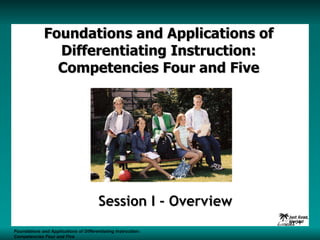
Differentiating Instruction Competencies Four Five Session I
- 1. Foundations and Applications of Differentiating Instruction: Competencies Four and Five Session I - Overview Foundations and Applications of Differentiating Instruction: Competencies Four and Five S1 -
- 3. HOW WE LEARN… (DALE’S CONE OF EXPERIENCE)
- 11. Ongoing Classroom Assessment: A Diagnostic Cycle Foundations and Applications of Differentiating Instruction: Competencies Four and Five S1 - Summative Assessment Formative Assessment Pre- Assessment
- 14. Foundations and Applications of Differentiating Instruction: Competencies Four and Five S1 -
Hinweis der Redaktion
- Introduce instructor Personal Professional
- Florida’s Formula for Reading Success - The following is on Handout S1-2 Five Critical Areas of Reading identified by the NRP (5) • Phonemic awareness • Phonics and word study • Fluency • Vocabulary • Comprehension Three Types of Assessment to Guide Instruction (3) • Screening to identify students who need additional instruction • Progress monitoring to determine if students are making adequate progress within the current instructional environment • Diagnosis to determine their specific instructional needs Initial Instruction in All Classrooms (ii) • An effective reading program has to integrate the five instructional components of effective reading instruction, identified by the NRP, into a comprehensive and cohesive instructional design. Such a design provides student-tailored instruction and includes the following: o Explicit and systematic instructional practices. o Collaborative support systems. o Many opportunities for practice with and without scaffolds. o Aligned student materials. Immediate Intensive Intervention (iii) • A classroom teacher or other teaching personnel can provide the additional instruction and practice some students may need. • Alternative instructional practices.
- Principles of Differentiation 1. Show Slide S1-11 and refer participants to Handout S1-8. 2. Ask participants if there are other principles they feel are important to add to this list. Post any suggestions on a chart and check at the end of the session to see if participants still feel these are fundamental beliefs.
- Differentiation Continuum 1. Share quote (Slide S1-14) as a transition into a discussion of the differentiation continuum. 2. Direct participants to examine the differentiation continuum (Slide S1-15/ Handout S1-8) and to think about their teaching practice. Ask participants to place themselves on the differentiation continuum for each of the items listed. Note to facilitator: For this slide, you will bring the continuum content into view one line at a time as you click through. The goal is to guide the participants through this reflection process. 3. After doing so, direct participants to the next slide for a pause and reflect that will deepen their reflection on their teaching practice.
- Share Slide S1-19 which suggests a diagnostic cycle for ongoing assessment.
- Share the following. Vygotsky’s Zone of Proximal Development Lev Vygotsky (1962, 1978) describes the “zone of proximal development,” a zone where new learning takes place — where the concept is slightly beyond the grasp of the learner (not quite at his frustration level, yet a bit above his independent level). The role of the teacher is to “coach” or push the learner to success (known as scaffolding) and then on to independence. With this cycle repeated, learners continue to succeed. The problem exists when the “zone” is different for each learner because of developmental or experiential differences. So, a teacher’s challenge becomes how to present material within this zone. Materials presented at or below the mastery level may result in no growth. Those presented well above the zone may result in frustration. Explain the concept of scaffolding (Slide S1-21/Handout S1-9). Scaffolding is an important concept for participants to understand in differentiation. Elena Bodrova and Deborah Leong in their book, Tools of the Mind (1996), suggest that scaffolding within the zone of proximal development occurs by decreasing assistance as the learner takes more responsibility himself. Scaffolding is the process of providing, and gradually removing, external support for learning. During scaffolding, the task itself is not changed, but what the learner initially does is made easier with assistance. As the learner takes more responsibility for performance of the task, less assistance is provided.
